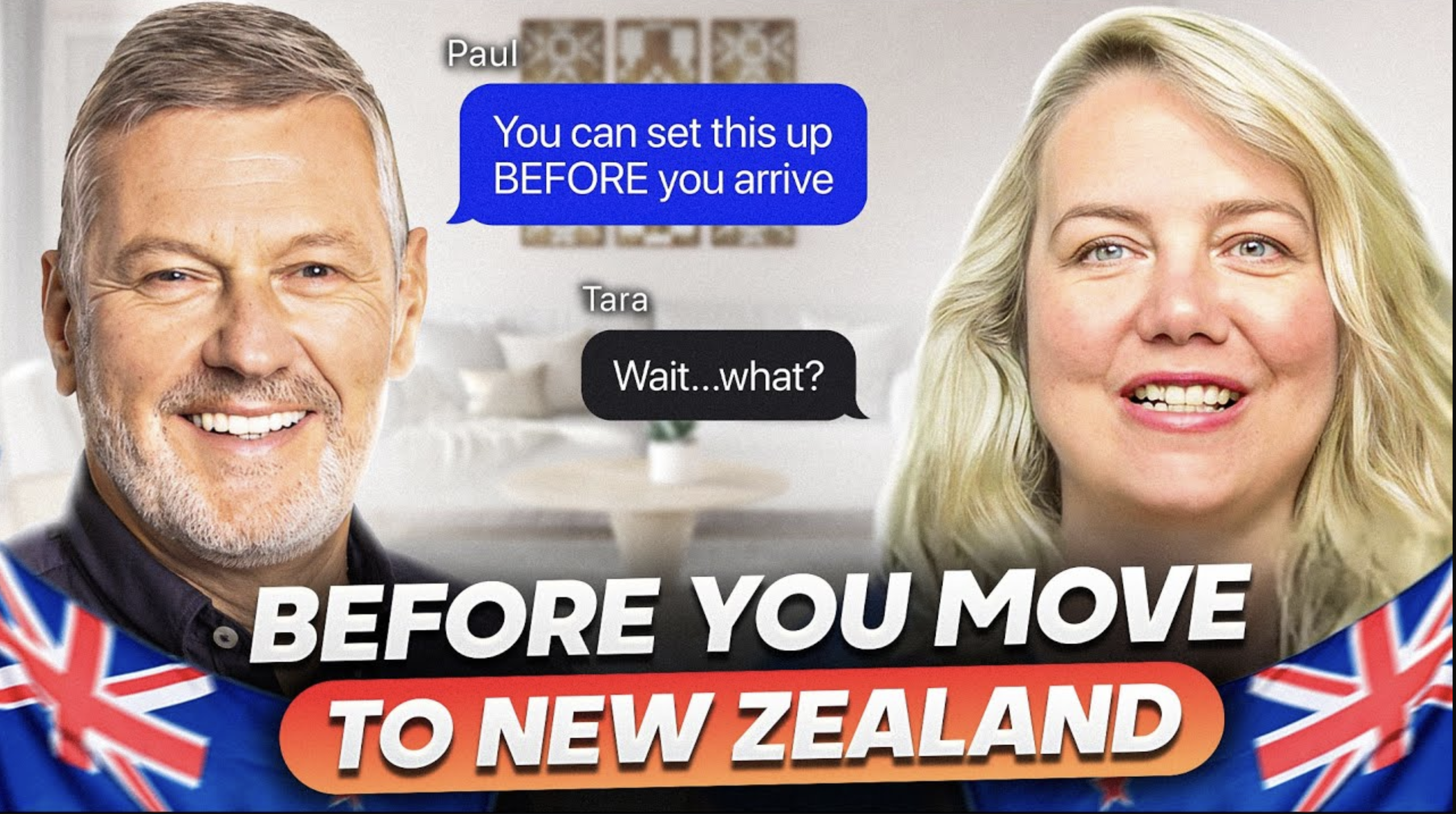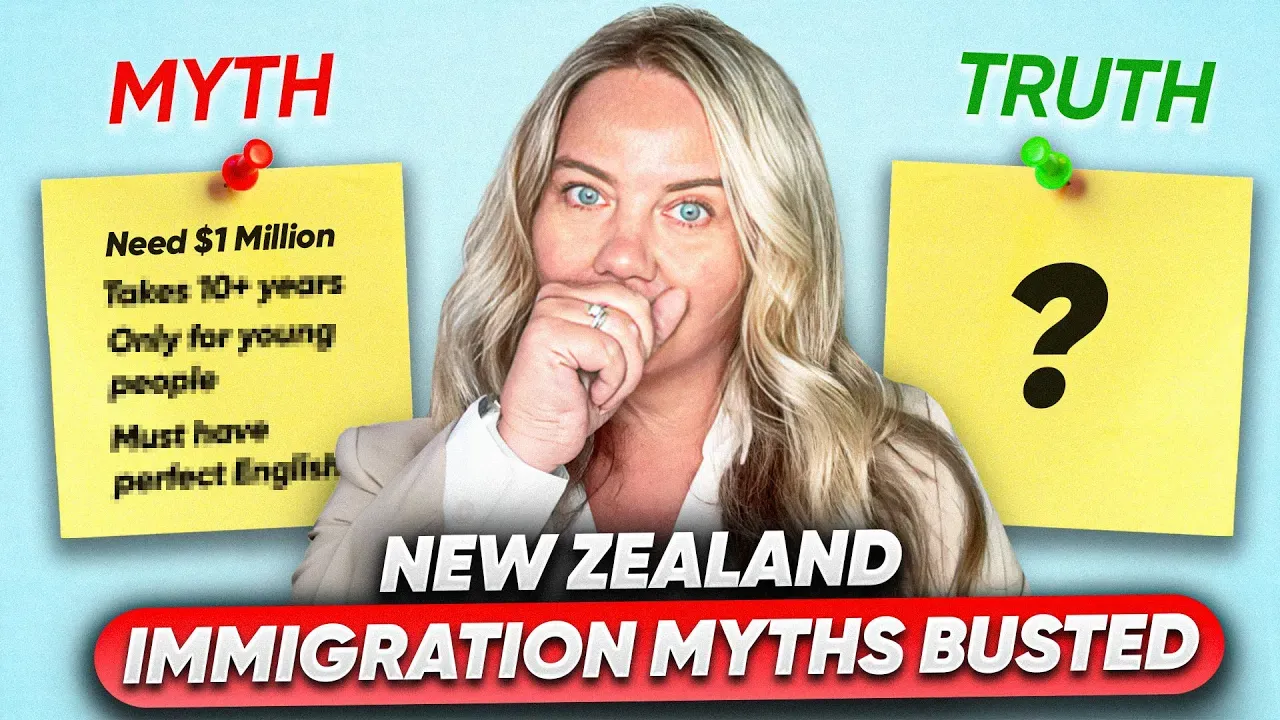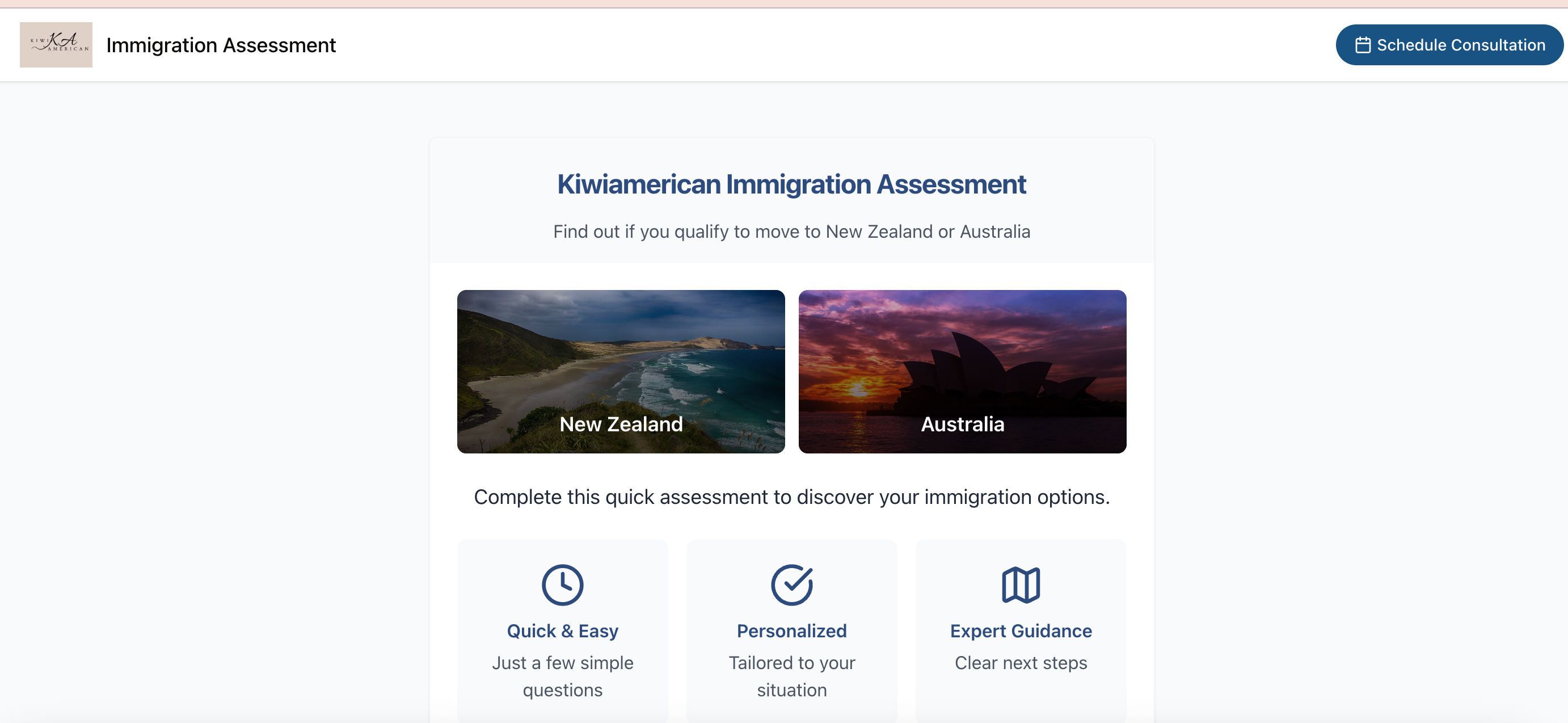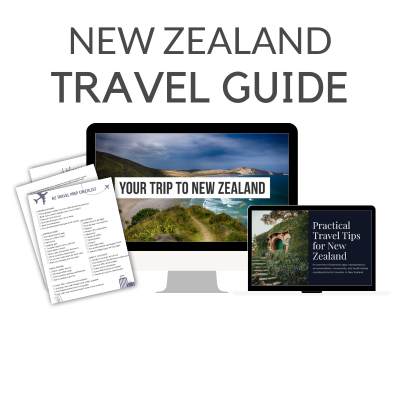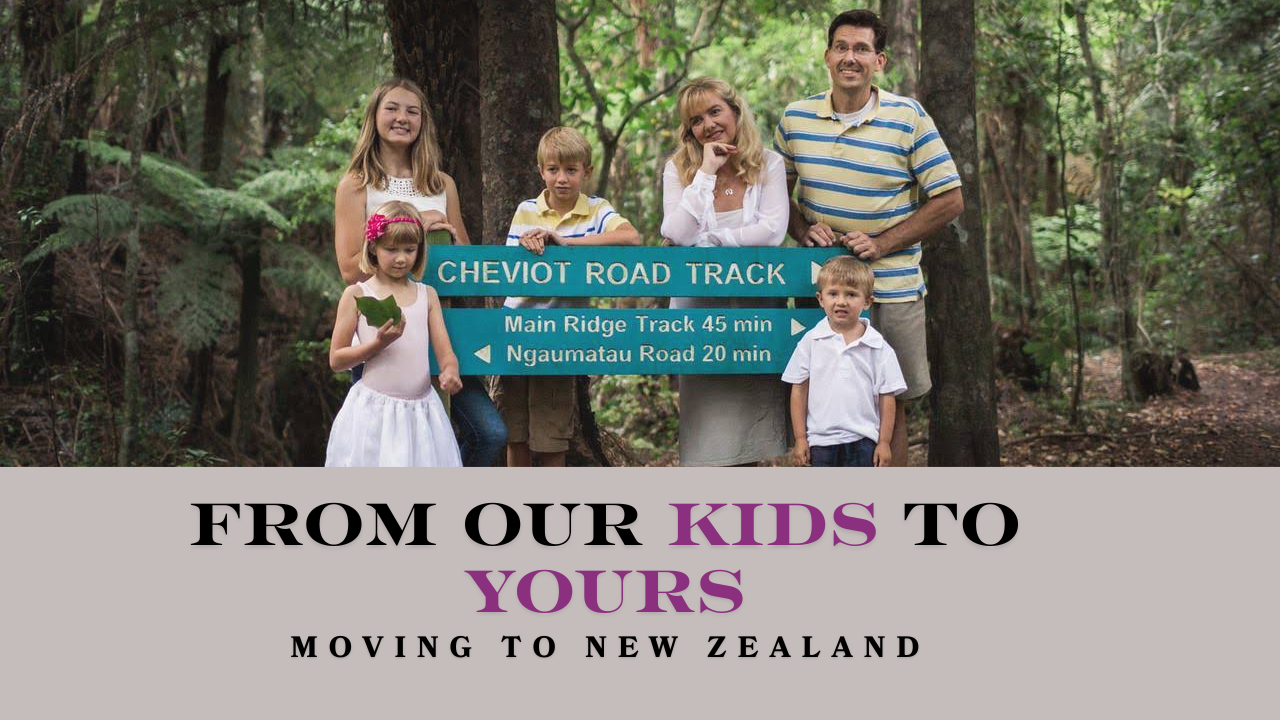Steps to Immigrate to New Zealand With Confidence
May 20, 2025
I'm Tara from Kiwiamericans, and back in 2013, I took the leap from the US to New Zealand. Let me tell you - it was the best decision I've ever made, but whew, was it a journey! Since then, I've helped hundreds navigate their own paths to Aotearoa (that's the Māori name for New Zealand, and you'll hear it a lot once you're here!). Check out my community with my proven relocation roadmap.
New Zealand truly is that magical place you've seen in movies - friendly communities, jaw-dropping landscapes, and a quality of life that still makes me pinch myself some mornings. But getting here? That takes some work.
In this guide, I'm sharing everything I wish someone had told me about immigrating to New Zealand - from visa pathways to settlement essentials. I'll cut through the confusion and give you the real deal on what it takes to make this move successfully.
Whether you're dreaming of better job prospects, a healthier work-life balance (something Kiwis absolutely nail!), or just wondering if the rumors about New Zealand's awesomeness are true (spoiler: they are), I've got you covered.
You'll need to understand things like visa options, qualification requirements, and English language proficiency. You might need to explore getting a diploma recognized or look into the NZ Skilled Migrant List. And yes, emerging industries like telecommunications, nursing, and mechanical engineering are huge here right now and desperately need skilled workers.
This article breaks down every step - from understanding your visa options to preparing for Kiwi life. I've packed it with both official requirements AND the stuff you won't find on government websites (like how to actually make friends with Kiwis, which took me longer than I care to admit!).
So grab a coffee (or as we say here, a "flat white"), and let's dive into your New Zealand immigration journey. I'm right here with you every step of the way!

Understanding Your Options to Immigrate to New Zealand
When I first decided to move to New Zealand, I spent WEEKS staring at immigration websites trying to figure out which visa pathway was right for me. It was overwhelming, to say the least! The good news? I've done all that confusing research for you. (How to move to New Zealand FREE Webinar)
Exploring Different Visa Pathways for New Zealand Immigration
New Zealand offers several visa options, and choosing the right one makes all the difference. For most of my clients, the Skilled Migrant Category (SMC) or Skilled Worker Visa ends up being the best fit.
Here's what you need to know:
-
Skilled Migrant Category: This points-based system evaluates your age, work experience, qualifications, and job offers. I had a client who's a registered nurse with a postgraduate diploma who scored well above the threshold - healthcare workers are in serious demand here!
-
Work to Residence: If you've got a job offer from an accredited employer, this can be your golden ticket. One of my members secured a position as an electrical engineer in Auckland and was on this pathway within months.
-
Investor Visas: Got substantial funds to invest in NZ? This might be your path. I've seen successful business owners transition smoothly through this route.
-
Family Categories: If you have family members who are NZ citizens or residents, this could be your way in. My cousin actually moved here through this route!
The labor market in New Zealand is constantly evolving, but sectors like telecommunications, engineering, and healthcare are consistently hungry for qualified professionals. I've seen firsthand how migrants with accredited qualifications get snapped up quickly by employers.
Assessing Your Eligibility for New Zealand Residency
Let's talk points! The points system initially confused the heck out of me, but it actually makes sense once you break it down.
New Zealand awards points based on:
- Your age (younger applicants score more points)
- Work experience (especially in areas on the skills shortage list)
- Qualifications (that diploma or degree is super valuable!)
- Job offers (this can be a massive points boost)
Before submitting an Expression of Interest (EOI), I always recommend my clients do a thorough self-assessment. When I applied, I discovered that my master's degree and work experience gave me more points than I expected!
Recently, Immigration New Zealand has placed increased emphasis on English language proficiency and health checks. I had one client who invested in additional English lessons before taking her IELTS test, and it pushed her over the points threshold.
One tip from my own experience: start gathering documentation EARLY. I spent months hunting down transcripts, employment verification letters, and certified copies of everything. Trust me, you don't want to be scrambling for these at the last minute!
Key Requirements for a Successful Immigration Journey
Beyond points, there are some non-negotiable requirements you'll need to meet:
- Valid identification: Passport, birth certificates, marriage certificates if applicable
- Photo Requirements: Photos that meet very specific requirements (I had to retake mine twice!)
- Certified translations: If your documents aren't in English, you'll need official translations
The health and character checks are serious business. New Zealand wants to ensure you're not going to be a burden on their healthcare system or pose any risk to the community. When I went through my medical exam, I was surprised by how comprehensive it was - chest X-rays, blood tests, the works!
I always tell people in high-demand sectors like mechanical engineering or law to start preparation early. One of my members who's a machinist had all his technical certifications verified months before he actually needed them, which saved him tons of stress later.
My biggest piece of advice? Create a detailed checklist. I still have my dog-eared, coffee-stained checklist from my own application process, and it was my lifeline when things got overwhelming.
Benefits of Choosing New Zealand for Skilled Migration
Why choose New Zealand? Well, beyond the breathtaking landscapes (which never get old, by the way), there are substantial practical benefits:
-
Work-life balance: When my friends back home are still at the office at 7 pm, I'm usually finishing up a hike or having dinner with friends. Kiwis work to live, not live to work.
-
Healthcare system: As someone who came from the US healthcare system, New Zealand's accessible healthcare was a revelation.
-
Education: If you have kids, they'll benefit from world-class education that doesn't cost a fortune.
-
Safety and stability: I sleep with my windows open here. Enough said.
For professionals in fields like nursing, radiography, or technical roles like machinists, the career opportunities are abundant. One of my members who's a registered nurse actually got THREE job offers within two weeks of arriving!
The country's commitment to diversity isn't just talk either. In my years here, I've witnessed genuine efforts to prevent discrimination and create inclusive workplaces. And honestly, the Kiwi approach to life - that laid-back, "she'll be right" attitude - is contagious in the best possible way.
Key Takeaways:
- New Zealand provides diverse visa pathways including skilled migrant, investor, family, and humanitarian visas
- Eligibility is assessed through a points system based on qualifications, work experience, and English language proficiency
- Meeting requirements like health and character checks is critical
- The benefits of immigrating extend beyond career opportunities to lifestyle, healthcare, and overall quality of life

Mastering the Skilled Migrant Category Visa New Zealand Requirements
If you're like most of my clients, the Skilled Migrant Category (SMC) visa is likely your best bet for making the move to New Zealand. When I was navigating this process myself, I found it complex but definitely doable with the right information. Let me break it down for you!
Calculating Your Points for the Skilled Migrant Category
The points system is the gatekeeper for the SMC visa. I remember obsessively checking my points calculation, worried I'd made a mistake somewhere!
Here's how the points generally stack up:
- Age: Younger applicants (20-39) get the most points
- Work experience: Points increase with years of relevant experience
- Qualifications: That diploma or postgraduate certificate is gold here!
- Job offer: Having one, especially in a field on the skills shortage list, is a massive boost
When I was helping Melissa, a registered nurse from Chicago with 8 years of experience, calculate her points, we discovered she had well over the threshold just with her nursing qualification and experience. Healthcare professionals often find themselves in this fortunate position.
The English language requirement tripped me up initially - I assumed as a native English speaker, I'd automatically qualify. Turns out, I still needed to provide evidence! Some of my non-native English speaking members have found that investing in language courses before taking the IELTS test made a significant difference in their scores.
One tip I always share: use Immigration New Zealand's official points calculator, but then double-check your calculation with an immigration advisor. When I did this, we found an additional 10 points I hadn't claimed!
Essential Qualifications and Work Experience Needed
Your qualifications and work experience are central to your application's success. When I was evaluating my own credentials, I was worried my American qualifications wouldn't translate well - but the process was actually pretty straightforward.
New Zealand highly values internationally recognized certifications and diplomas. All qualifications need to be verified by the New Zealand Qualifications Authority (NZQA). One of my members who's an engineering technician spent several weeks gathering detailed documentation about his training program's curriculum to ensure it met NZ standards.
Work experience in sectors critical to New Zealand's growth can significantly boost your application. I've seen this especially with healthcare professionals, IT specialists, and construction experts. Craig, one of my members who's a mechanical engineer with 15 years of experience, found that his specialized knowledge in sustainable building practices made him particularly attractive to NZ employers.
The NZ Skilled Migrant List is your best friend here - it shows you exactly which occupations are in demand. I update my members regularly on changes to this list because it does shift based on the country's needs.
Meeting the English Language Proficiency Standards
English language proficiency is non-negotiable for the visa process, even for native English speakers like myself! I was surprised when I had to provide evidence of my English language ability, but it makes sense - clear communication is essential for integration.
Applicants typically take tests like IELTS or TOEFL, with minimum score requirements. One of my members from Texas joked that she had to "prove she spoke Texan, not English" - but the test was straightforward for her.
For non-native speakers, this can be one of the more challenging requirements. Maria, a telecommunications specialist from Brazil in my membership program, spent six months improving her English before taking the test. Her dedication paid off - not only did she meet the visa requirements, but her confidence during job interviews skyrocketed.
From what I've observed with my community members, those who excel in language tests tend to find employment much faster after arrival. Employers see strong English skills as an indicator that you'll integrate well into their workplace.
Health and Character Checks for Visa Applicants
The health and character checks often make applicants nervous, but they're actually pretty straightforward if you're prepared.
For the health check, you'll need a comprehensive medical examination from an approved physician. When I went through this process, I was surprised by how detailed it was - chest X-rays, blood tests, and a full physical examination. One member with a pre-existing condition was worried it would disqualify her, but after providing additional documentation from her specialists, her application was approved.
Character checks involve police certificates from every country you've lived in for 12+ months over the past 10 years. I had to get documents from both the US and a country I'd worked in briefly, which took several weeks. Start this process early - some countries (looking at you, FBI clearances!) can take months to provide these documents.
Clean records in both areas significantly strengthen your application. Immigration New Zealand takes these checks seriously - they want to ensure new residents will contribute positively to the country.
Understanding the Job Offer Requirement From an Accredited Employer
While not mandatory for all SMC visa applicants, having a job offer from an accredited New Zealand employer can be a game-changer. When my client Jason received a job offer as a software developer in Wellington, his points score jumped above the selection threshold immediately.
Accredited employers have been vetted by Immigration New Zealand and have demonstrated their commitment to fair employment practices. They're essentially pre-approved to hire foreign workers, which can make your visa process smoother.
I've found that candidates with job offers from accredited employers often have their applications processed more quickly. The job offer serves as evidence that your skills are needed and that you'll be able to contribute economically right away.
When one of my members, a civil engineer from Detroit, received her job offer, it came with a detailed employment contract that outlined her role, salary, and benefits. Having this comprehensive documentation strengthened her application significantly.
Key Takeaways:
- The points-based system evaluates factors including age, qualifications, work experience, and English proficiency
- Recognized qualifications and relevant work experience in critical sectors are essential
- Meeting English language requirements is crucial, even for native speakers
- Health and character checks require thorough preparation and documentation
- A job offer from an accredited employer can significantly boost your application

Navigating the Skilled Worker Visa New Zealand Application Process
The application process itself can feel like climbing a mountain - I remember staring at my computer screen wondering if I was doing everything right! Let me walk you through it based on both my experience and what I've learned helping hundreds of Americans through this journey.
Submitting Your Expression of Interest (EOI) Accurately
Submitting your Expression of Interest is where the rubber meets the road. I still remember triple-checking every field before hitting submit on my own application!
The EOI is essentially telling Immigration New Zealand, "Hey, I'm interested in moving to your country, and here's why I'd be a great addition." You'll detail your qualifications, work experience, and other factors that contribute to your points score.
Accuracy here is CRITICAL. One of my members accidentally entered an incorrect date for a previous job, which triggered a verification check that delayed her application by weeks. I recommend having someone else review your EOI before submission - a fresh pair of eyes can catch errors you might miss.
Another tip from my experience: gather digital copies of all supporting documents before you start. Having everything at your fingertips makes the process much smoother. I created a dedicated folder on my computer with subfolders for education, employment, identifications, etc. - this organization saved me countless hours.
Once submitted, your EOI goes into a pool and is ranked against other applicants. With sufficient points (currently 160 with a job offer or 180 without), you'll be selected from the pool and invited to apply.
Preparing for the Invitation to Apply (ITA)
Receiving an Invitation to Apply feels amazing - I actually did a little dance around my living room when mine came through! But then reality sets in: now you need to prove everything you claimed in your EOI.
When you receive your ITA, Immigration New Zealand essentially says, "We're interested in you based on what you've told us. Now show us the evidence." This is where all that documentation preparation pays off.
I advise my members to start organizing their supporting documents even before receiving the ITA. Sarah, a radiographer from California, created a spreadsheet tracking each document, whether it needed certification, and its expiration date (if applicable). When her ITA arrived, she was ready to go within days.
Remember that any discrepancies between your EOI and your formal application can lead to delays or even rejection. If your circumstances have changed since submitting your EOI (new job, additional qualifications), be prepared to explain these changes.
Gathering and Organizing Your Supporting Documentation
Documentation is the backbone of your application. When I was applying, my dining table disappeared under piles of papers for weeks!
Required documents typically include:
- Proof of identity (passport, birth certificate)
- Evidence of qualifications (diplomas, academic transcripts)
- Employment verification (reference letters, contracts, pay stubs)
- English language test results
- Health examination results
- Character certificates (police clearances)
- Proof of funds
For professional qualifications, you'll need original or certified copies. I had one member who's a nurse practitioner who needed to get her nursing diploma, postgraduate certificates, and state licensing all verified - it was quite the process!
Organization is key. I created a document checklist and physically arranged my papers in the same order as the application form. This might seem overly methodical, but when you're dealing with dozens of documents, this system prevents oversight.
Many of my members have found that detailed reference letters from previous employers made a significant difference. These should outline not just employment dates and job titles, but specific responsibilities and achievements.
Lodging Your Skilled Worker Visa Application Online
Once your ITA arrives and your documents are in order, it's time to submit your formal application online. The digital system is generally user-friendly, but it requires attention to detail.
When uploading documents, ensure they meet the format requirements (usually PDF) and file size limitations. I had to spend an evening scanning and compressing documents to get them to upload properly - not how I planned to spend my Saturday night!
Follow the online instructions meticulously. The system will guide you through each section, and you can save your progress and return later if needed. I completed my application over several sessions to ensure I wasn't rushing through important details.
One tip from a member who's a telecommunications specialist: start the online application early in the day when you're fresh, not late at night when you're tired. He made a few errors in his late-night submission that required clarification later.
After submission, keep a complete digital and physical copy of everything you've submitted. You never know when you might need to reference these materials again.
Tracking Your Application and Responding to Immigration New Zealand Requests
After submission comes the waiting game - possibly the hardest part! Immigration New Zealand provides online tracking tools that allow you to monitor your application's progress.
Often, immigration officers will request additional information or clarification. Don't panic if this happens - it's actually quite common. When I received a request for additional evidence about my previous employment, I initially freaked out, thinking my application was in trouble. In reality, they just needed more specific documentation.
Respond to these requests promptly and thoroughly. When one of my members, a mechanical engineer, received a request for more detailed information about his qualifications, he not only provided the requested documents but included a clear cover letter explaining how each document addressed their specific questions.
Being proactive during this phase demonstrates your commitment and reliability. I check in with my members regularly during this waiting period - it can be an emotional rollercoaster, and having support makes a big difference.
Key Takeaways:
- Submit your Expression of Interest (EOI) with meticulous attention to accuracy
- Prepare thoroughly for the Invitation to Apply by organizing all required evidence
- Create a systematic approach to gathering and organizing supporting documentation
- Follow technical guidelines carefully when lodging your online application
- Respond promptly and comprehensively to any additional requests from Immigration New Zealand
Securing Employment for Your Skilled Migrant Visa New Zealand
Finding a job in New Zealand isn't just about boosting your visa application - it's about creating a foundation for your new life. When I was job hunting from the US, I made some serious mistakes that I'm hoping you can avoid!
Identifying in-Demand Occupations and Industries
New Zealand's job market has some definite hot spots. When I first started researching, I was surprised by which skills were in highest demand - they weren't always what I expected!
Currently, healthcare is absolutely booming. Registered nurses, doctors, and radiographers are in such high demand that many of my members in these fields had jobs lined up before they even arrived. Mark, an ICU nurse from Boston, had three different hospitals interested in him within weeks of starting his job search.
Engineering is another strong sector - particularly civil, electrical, and mechanical engineering. The ongoing infrastructure development and construction boom mean these professionals are highly sought after. One of my members who's a structural engineer received a job offer with relocation assistance included!
Information technology, telecommunications, and trades (like qualified electricians and plumbers) also consistently appear on skills shortage lists. I have several members who are machinists and technical specialists who found the transition relatively smooth because their skills were so valuable here.
Use resources like the New Zealand Skilled Migrant List as your guide, but also look at job sites like Seek and TradeMe Jobs to get a real-time view of the market. The New Zealand Herald also regularly reports on industry trends and skills shortages.
Pro tip from my experience: look beyond the major cities. While Auckland and Wellington have the most job listings, competition can be fierce. Some of my most successful members found opportunities in smaller centers like Hamilton, Tauranga, or Christchurch, where their skills were even more valued.
Crafting a New Zealand-specific Curriculum Vitae and Cover Letter
This is where many Americans trip up - New Zealand CVs are DIFFERENT! I learned this the hard way when my perfectly polished American résumé got zero responses.
New Zealand employers prefer clear, concise, and achievement-focused documents. Here's what I've learned works best:
- Keep your CV to 2-3 pages maximum (not the one-page American standard)
- Include a professional summary that clearly states your expertise
- Focus on achievements with measurable outcomes, not just responsibilities
- Include some personal information that would be unusual in the US (like hobbies)
- Use simple, straightforward language rather than corporate jargon
Your cover letter should directly address why you're interested in New Zealand specifically. When I rewrote mine to include my genuine passion for New Zealand's approach to work-life balance and outdoor lifestyle, response rates skyrocketed.
For specialized fields, highlight relevant certifications and experience. One of my members who's a mechanical engineer emphasized his experience with earthquake-resistant design, which was particularly relevant to New Zealand's seismic concerns.
Don't forget to adapt to New Zealand English! It's closer to British English than American, so adjust your spelling (programme, not program; organisation, not organization) and terminology accordingly.
I have partnered with HIRED, which helps you to kiwify your CV! They even can create you a new CV/Cover letter for EACH job you are applying for. Put "kiwiamericans" in at checkout to get 10% off.
Networking and Job Searching Strategies for New Zealand
Networking in New Zealand operates differently than in the US - it's less formal but equally important. When I first arrived, I was surprised by how willing Kiwis were to help once I stopped being so "American" about my networking approach!
Virtual networking before arrival can be incredibly effective. LinkedIn is widely used, but approach connections with authenticity rather than aggressiveness. A member of my community who's in telecommunications connected with industry groups on LinkedIn and participated in discussions for months before her move. By the time she arrived, she already had coffee meetings lined up with potential employers.
Professional associations are gold mines for connections. Whether you're in nursing, engineering, IT, or law, joining relevant industry groups gives you access to job boards, events, and networking opportunities that aren't advertised publicly.
Recruiters can be invaluable allies in your job search. Many of my members have found success working with specialist recruiters who understand their field and have established relationships with employers. Janet, a healthcare administrator, connected with a healthcare-specific recruitment agency that found her a position within three weeks.
Don't underestimate the power of online forums and expatriate communities either. I've seen countless job leads shared through these informal channels. Sometimes a simple "I'm moving to Wellington and have experience in X field" post can lead to surprising opportunities.
Understanding Accredited Employers and Their Role
Accredited employers are essentially pre-approved by Immigration New Zealand to hire foreign workers. When I got my first job offer, I had no idea about the importance of employer accreditation - but it makes a huge difference!
These employers have demonstrated their commitment to fair employment practices and supporting migrant workers. They undergo regular audits and must maintain certain standards to keep their accreditation.
A job offer from an accredited employer gives you significant advantages:
- Additional points for your visa application
- Often a faster visa processing time
- Greater confidence in the legitimacy and stability of the position
One of my members who's a registered nurse received offers from both an accredited and non-accredited hospital. Although the non-accredited position offered slightly higher pay, she chose the accredited employer for the visa benefits and ended up with a much smoother immigration process.
You can check if an employer is accredited through the Immigration New Zealand website. During interviews, don't be afraid to ask about a company's accreditation status - it shows you're knowledgeable about the immigration process.
Preparing for Job Interviews With New Zealand Employers
Kiwi job interviews feel different from American ones - more casual but equally substantive. When I had my first interview with a New Zealand company, I was thrown off by how conversational it was!
New Zealand employers place significant emphasis on cultural fit. They want to know not just if you can do the job, but if you'll fit into their team and workplace culture. Be prepared for questions about how you handle challenges, work with others, and adapt to new environments.
Technical competence matters, but so does your understanding of New Zealand workplace norms. Research the company thoroughly and be prepared to demonstrate how your experience aligns with their needs. One of my members who's an engineering technician researched New Zealand's building codes before his interview, which impressed the hiring manager.
Expect questions about why you want to live in New Zealand specifically. Employers want to ensure you're committed to staying long-term, not just using the job as a temporary stepping stone. Share your genuine reasons for wanting to make New Zealand home.
Show awareness of and respect for Māori culture and the Treaty of Waitangi. Many workplaces incorporate Māori values and practices, and demonstrating your openness to learning about this important aspect of New Zealand life is viewed positively.
Practice virtual interviewing if you're applying from overseas. Technical glitches can derail an otherwise strong interview, so test your setup beforehand. One of my members even scheduled her interviews during New Zealand business hours (which meant middle of the night for her in Texas) to show her commitment.
Key Takeaways:
- Focus on in-demand sectors like healthcare, engineering, telecommunications, and skilled trades
- Adapt your CV and cover letter to New Zealand expectations and language
- Build networks through professional associations, LinkedIn, and expatriate communities
- Understand the advantages of securing employment with an accredited employer
- Prepare for interviews that emphasize cultural fit alongside technical competence
Preparing for Your Move and Arrival in New Zealand
Once that visa comes through, the real adventure begins! Preparing for your actual move takes careful planning - I learned this through both my own mistakes and watching hundreds of clients navigate this exciting but challenging transition.
Financial Planning and Proof of Funds for Settlement
Let's talk money - because moving countries isn't cheap! When I moved, I underestimated some costs and was caught off guard. Don't be like me!
Immigration New Zealand requires proof that you can support yourself (and any family) upon arrival. The exact amount varies, but having at least NZD $10,000 per adult is a good starting point. This needs to be in easily accessible accounts, not tied up in investments or property.
Beyond the immigration requirements, budget for:
- Temporary accommodation (expect at least NZD $3,000-5,000 for the first month)
- Rental bond and advance rent (typically 4 weeks' bond + 2 weeks' rent upfront)
- Transportation (car purchase or public transport costs)
- Setting up utilities (deposits are often required)
- Basic furnishings and household items
Remember that the cost of living in New Zealand can be higher than many parts of the US, particularly for housing, groceries, and consumer goods. Auckland is significantly more expensive than smaller cities or towns.
I always recommend my members maintain an emergency fund covering at least 3-6 months of expenses. One family in my community who moved to Christchurch created a detailed spreadsheet tracking every expected expense for their first six months - this preparation gave them tremendous peace of mind.
Banking can be tricky when moving countries. I suggest opening a New Zealand bank account before arrival if possible (some banks allow this). A member who's an investment advisor set up his NZ account three months before moving and gradually transferred funds to avoid a single large international transfer fee.
Arranging Accommodation and Initial Settlement Services
Finding your first home in New Zealand is both exciting and challenging! When I first arrived, I stayed in an Airbnb for three weeks while I looked for more permanent housing - and I'm so glad I did.
For initial accommodation, consider:
- Short-term rentals or serviced apartments
- Extended stay hotels
- Airbnb or similar platforms
- Temporary house-sharing arrangements
The rental market moves FAST in New Zealand, especially in Auckland and Wellington. Properties often rent within days of listing, sometimes after just one viewing. Be prepared to make quick decisions and have your paperwork ready (references, employment confirmation, etc.).
I recommend researching neighborhoods extensively before arrival. Consider factors like proximity to work, schools (if relevant), public transport, and amenities. When I was choosing between suburbs in Auckland, I spent hours on Google Street View virtually "walking" around different neighborhoods!
Settlement services can be incredibly helpful during your transition. These include:
- Migrant resource centers that offer orientation programs
- Community organizations specific to your area
- Online expatriate groups
- Relocation services (sometimes provided by employers)
One of my members who's a telecommunications specialist connected with his local migrant center immediately upon arrival and found invaluable assistance with everything from school enrollment for his children to understanding how the healthcare system works.
Understanding New Zealand Culture and Lifestyle
Cultural adjustment is real, folks! Even though we speak the same language (mostly), there are significant cultural differences between the US and New Zealand. I experienced some serious culture shock despite thinking I was well-prepared.
New Zealand's culture blends European and Māori influences, creating a unique identity. The Treaty of Waitangi is foundational to the country's approach to cultural relations, and you'll notice Māori language and customs integrated into daily life.
Some cultural aspects that surprised me:
- The tall poppy syndrome: Kiwis tend to be modest about achievements, and overt self-promotion can be seen negatively
- The direct communication style: People are straightforward but with less confrontation than Americans might be used to
- The relaxed attitude toward time and schedules outside of work
- The genuine work-life balance priority
Outdoor activities are central to Kiwi culture. Whether it's hiking (called "tramping" here), water sports, rugby, or cricket, getting outside is part of the lifestyle. I barely knew how to put up a tent when I arrived - now weekend camping trips are my norm!
Environmental consciousness is deeply ingrained in New Zealand society. Recycling, conservation, and sustainable practices are taken seriously. My first week here, I got a friendly but firm lesson from a neighbor about proper recycling sorting!
Understanding local slang and humor helps tremendously with integration. Kiwis love their unique phrases and abbreviations - everything gets shortened! It took me months to understand what "sweet as" meant (it's a positive affirmation, by the way).
Transferring Your Qualifications and Skills
Getting your qualifications recognized in New Zealand is a critical step that many overlook until too late. I had several members who discovered their credentials weren't automatically recognized and needed additional certification.
The New Zealand Qualifications Authority (NZQA) evaluates international qualifications against New Zealand standards. This process can take several weeks or even months, so start early! For many professions - especially regulated ones like nursing, engineering, or teaching - you'll need formal recognition before you can practice.
Different fields have different requirements:
- Healthcare professionals often need to register with specific councils (like the Nursing Council or Medical Council)
- Engineers may need to apply for membership with Engineering New Zealand
- Teachers must register with the Teaching Council
- Tradespeople might need to obtain local certification
One of my members who's a mechanical engineer discovered that while his degree was recognized, he needed additional certification to sign off on certain types of projects. Knowing this ahead of time allowed him to complete the necessary courses before fully committing to his move.
For some technical qualifications, practical assessments might be required alongside paper credentials. A member who's an electrician had to demonstrate his skills through a practical evaluation before receiving full New Zealand certification.
Enrolling Children in Schools and Accessing Healthcare
If you're moving with children, education will be a top priority. The good news? New Zealand's education system is excellent, though quite different from the US system in some ways.
The school year runs from late January/early February to mid-December, with four terms separated by holidays. This schedule adjustment can be challenging if you're moving mid-year. One of my members who moved with three school-age children arrived in June (middle of the school year here) and found the transition slightly bumpy but manageable.
To enroll in schools, you'll need:
- Proof of address in the school zone (for public schools)
- Children's birth certificates or passports
- Previous school records
- Immunization records
Most public schools have geographic "zones" and give priority to students living within them. If you have specific schools in mind, this might influence where you choose to live. Private schools and integrated schools (privately owned but government funded) typically don't have zoning restrictions but may have waiting lists.
Healthcare in New Zealand operates on a mixed public-private system. Once you have your residence visa, you'll have access to heavily subsidized public healthcare. However, many people choose to maintain private health insurance for faster access to specialists and elective procedures.
To access healthcare, register with a local General Practitioner (GP) as soon as possible after arrival. This becomes your primary healthcare contact. Without a GP referral, accessing specialist care can be difficult.
For families with ongoing health concerns, research the availability of specialists in advance. While major centers have comprehensive medical facilities, smaller towns might require travel for specialized care. A member of my community with a child needing regular occupational therapy specifically chose their location based on service availability.
Key Takeaways:
- Create a comprehensive financial plan covering both immigration requirements and actual settlement costs
- Arrange temporary accommodation while researching longer-term housing options
- Prepare for cultural adjustment by learning about Kiwi values and social norms
- Start qualification recognition processes early through NZQA and professional bodies
- Research school zones and healthcare providers before deciding on your exact location

Settling Successfully and Building Your Future in New Zealand
The visa's approved, you've arrived, and now the real adventure begins! Those first months in New Zealand are simultaneously exciting and overwhelming. Here's how to navigate them successfully and set yourself up for long-term happiness in your new home.
Post-Arrival Formalities and Obtaining an IRD Number
First things first - there are some essential administrative tasks to tackle immediately upon arrival. The most urgent is getting your IRD (Inland Revenue Department) number, which is New Zealand's equivalent of a social security number.
Without an IRD number, you'll be taxed at the highest rate, and you'll face challenges opening bank accounts or accessing government services. I waited two weeks to apply for mine and regretted it when my first paycheck came through with emergency tax deductions!
Applying for an IRD number is straightforward:
- Complete the IR742 form (available online)
- Provide your passport, visa documentation, and proof of New Zealand address
- Submit in person at an AA Shop or via post
Most of my members receive their IRD number within 1-2 weeks. In the meantime, focus on other essential setups:
- Finalizing your bank account (if you haven't already opened one remotely)
- Getting a New Zealand SIM card or phone plan
- Registering with a local doctor/GP
- Applying for a New Zealand driver's license (you can drive on most foreign licenses for up to 12 months, but getting a local one is advisable)
If you're bringing a car or planning to buy one, you'll need to understand New Zealand's vehicle registration and Warrant of Fitness (WoF) systems. I bought my first car here without understanding the WoF expiry date and ended up with unexpected costs!
These administrative tasks might seem mundane, but completing them efficiently sets the foundation for a smooth transition. One of my members who's a project manager created a "New Zealand Settlement Project Plan" with timelines for each task - clever thinking!
Integrating Into the Local Community and Building Networks
Making friends as an adult in a new country can be challenging - this was honestly one of the hardest parts of my move! Kiwis are friendly but often have established social circles that can be difficult to break into.
Successful integration strategies I've found include:
- Joining local clubs or sports teams (I joined a hiking group and made some of my closest friends there)
- Volunteering for community organizations (great for meeting like-minded people)
- Attending local events and festivals
- Taking classes or workshops in areas of interest
- Connecting with parent groups if you have children
Professional networking is equally important for career growth. Industry associations, chambers of commerce, and professional development groups provide valuable opportunities to connect with colleagues in your field.
Understanding Kiwi social norms helps tremendously. For example, bringing a plate (contribution of food) to gatherings is common practice, and punctuality is valued but with less rigidity than in some cultures. When I first arrived, I was often too early to social events - I've since learned to relax my American punctuality a bit!
For families, school communities can be wonderful integration points. One of my members who relocated with three children found that school events, sports teams, and parent committees quickly connected them to their community.
Don't be discouraged if building deep friendships takes time. Many of my members report that their social circles expanded significantly in their second year as they became more comfortable and integrated into local rhythms.
Understanding Pathways to Permanent Residency and Citizenship
While you're settling in, keep an eye on your longer-term immigration goals. For most skilled migrants, the path progresses from temporary visas to permanent residency and potentially citizenship.
Permanent residency typically becomes available after holding a residence visa for a certain period (usually two years) while living in New Zealand. The benefits of permanent residency include:
- No travel restrictions or visa renewals needed
- Full access to healthcare and education services
- Ability to vote in elections
- Greater job security
Citizenship is the final step for many migrants, available after five years of residency. New Zealand allows dual citizenship with many countries, including the United States, which means you don't necessarily have to surrender your American passport.
The process requires demonstrating your commitment to New Zealand through:
- Physical presence (you need to have spent sufficient time in NZ)
- Good character
- Understanding of the responsibilities of citizenship
- Knowledge of New Zealand society
- English language proficiency
- Intention to continue living here
I have many members who've successfully obtained permanent residency and citizenship. One family in my community recently attended their citizenship ceremony and described it as one of the most meaningful moments of their lives.
Keep all immigration documents organized and be mindful of important dates. Set calendar reminders for visa renewals or applications well in advance to avoid any stressful last-minute situations.
Accessing Support Services for New Migrants
New Zealand offers excellent support services for migrants, but many people don't realize what's available. I certainly didn't take full advantage of these resources when I first arrived!
Some valuable support services include:
- Citizens Advice Bureau (CAB), which provides free information and advice on nearly any topic
- Settlement support services through Immigration New Zealand
- Migrant resource centers in major cities
- English language classes (often free or subsidized)
- Career development services
- Cultural orientation programs
These services can help with practical matters like understanding your tenancy rights, navigating the healthcare system, or accessing community resources. They can also provide emotional support during what can be a challenging transition period.
Many of my members have found ethnic or cultural community groups tremendously helpful. These groups often organize social events, celebrate familiar holidays, and provide a space where you can relax among people who understand your background.
Don't hesitate to ask for help when needed. Kiwis are generally very willing to assist, but they might not realize you're struggling unless you speak up. I've learned that asking for directions or recommendations is not just practical but often leads to wonderful conversations and connections!
Long-Term Career Development and Opportunities in New Zealand
Once you're settled, focusing on long-term career growth becomes important. The New Zealand job market might offer different opportunities than you're used to - both in terms of challenges and benefits.
Career development in New Zealand often emphasizes:
- Practical experience alongside formal qualifications
- Adaptability and ability to handle diverse tasks (especially in smaller organizations)
- Collaborative skills and teamwork
- Work-life balance as a genuine priority
Continuing education is highly valued and accessible. Universities, polytechnics, and industry training organizations offer various professional development courses, certifications, and advanced degrees. A member of my community who's a telecommunications specialist completed a specialized certification program that led to a significant promotion within a year of arrival.
Professional associations provide excellent networking and development opportunities. Whether you're in healthcare, engineering, IT, or business, joining your industry organization connects you with peers, mentorship opportunities, and often job listings not advertised publicly.
Be prepared for a potentially different career trajectory. New Zealand organizations tend to be smaller than their American counterparts, which might mean broader roles with more diverse responsibilities but potentially slower upward mobility. However, many find the quality of work life and project diversity more than compensates for traditional career ladder differences.
Several of my members have successfully launched their own businesses in New Zealand, finding the regulatory environment relatively straightforward compared to the US. The government offers various resources for entrepreneurs and small business owners, including grants and advisory services.
Key Takeaways:
- Complete essential post-arrival formalities promptly, starting with your IRD number application
- Build community connections through social groups, volunteering, and professional networks
- Understand the pathways to permanent residency and citizenship for long-term security
- Utilize available support services designed specifically for new migrants
- Invest in continuous professional development to maximize career opportunities in New Zealand
Frequently Asked Questions
Over the years of running Kiwiamericans, I've answered THOUSANDS of questions from people at every stage of their immigration journey. Here are the ones that come up most frequently:
Q: What is the first step to immigrate to New Zealand?
A: Start by researching visa options to identify which pathway fits your situation best. For most Americans I work with, this means exploring the Skilled Migrant Category or Work to Residence visas. Before diving into applications, honestly assess your qualifications, work experience, and English language proficiency against current immigration requirements.
I always recommend creating an Immigration New Zealand (INZ) online account and exploring their website, which has comprehensive information about each visa type. This is exactly how I started my own journey - gathering information before making any concrete moves.
Q: How do I calculate my points for the Skilled Migrant Category visa?
A: Points are calculated based on factors like age, qualifications, work experience, job offers, and language proficiency. Immigration New Zealand provides an official points calculator on their website that gives you a good estimate.
When I was calculating my own points, I found it helpful to create a spreadsheet where I could track different scenarios - "What if I get a job offer?" or "What if I complete this additional certification?" This helped me understand what I needed to focus on to strengthen my application.
Remember that meeting the minimum points threshold (currently 160) doesn't guarantee selection - the actual cutoff varies based on the quality of applicants in each selection round.
Q: Why is securing employment important for the visa application?
A: A job offer, especially from an accredited employer, can dramatically improve your visa prospects. It not only adds significant points to your application score but also demonstrates your employability and potential contribution to New Zealand.
Beyond the application benefits, having a job arranged before arrival makes the transition infinitely smoother. When I arrived with employment already secured, it provided financial stability and instant professional connections that helped me settle in much more quickly.
For many visa categories, employment is either required or strongly advantageous. The concrete evidence that your skills are needed in the New Zealand labor market makes immigration officials much more likely to approve your application.
Q: What should I do immediately after arriving in New Zealand?
A: Your first priorities should be obtaining an IRD number, setting up a bank account (if you haven't already), registering with a local doctor, and finalizing your accommodation arrangements.
When I first arrived, I created a checklist prioritized by urgency - IRD number first, followed by healthcare registration, then driver's license. Having this systematic approach prevented me from feeling overwhelmed by all the new systems and processes.
Don't forget to also register your address with Immigration New Zealand, as keeping them updated with your contact information is a visa condition. I set calendar reminders for all these administrative tasks to make sure nothing fell through the cracks during the excitement of arrival.
Q: Can I transfer my international qualifications to New Zealand?
A: Yes, but they need to be assessed by the New Zealand Qualifications Authority (NZQA) to determine how they compare to New Zealand standards. Some professions also require registration with professional bodies.
The process varies depending on your field. For example, healthcare professionals need to register with specific councils, engineers might need Engineering New Zealand recognition, and teachers must register with the Teaching Council.
Start this process early - it can take several weeks or months to complete. I've worked with members who began their qualification assessments nearly a year before they planned to move, which gave them plenty of time to address any gaps or additional requirements identified during the evaluation.
Q: What support services are available for new migrants?
A: New Zealand offers comprehensive support for new migrants through various channels:
- Settlement Information services through Immigration New Zealand
- Citizens Advice Bureau for general support and information
- Migrant resource centers in major cities
- Community groups and cultural associations
- Regional newcomer networks
- English language training programs (many free or subsidized)
I found the local migrant center in Auckland incredibly helpful during my early months here. They offered orientation sessions, explained how various systems worked, and connected me with community groups. Many of my members have had similar positive experiences with these services.
Q: How long does it usually take to get permanent residency?
A: The pathway to permanent residency typically takes at least two years after obtaining your initial residence visa. This requires maintaining employment, meeting visa conditions, and spending sufficient time physically present in New Zealand.
Once you've held a residence visa for the required period, applying for permanent residency is relatively straightforward. The process involves demonstrating that you've met your visa obligations and intend to make New Zealand your home.
Many of my members who followed the skilled migrant pathway were able to apply for permanent residency after 2-3 years, with citizenship applications possible after five years of residency. The exact timeline depends on your specific visa conditions and individual circumstances.
Final Thoughts
Whew! We've covered a LOT of ground in this guide, from understanding visa options and requirements to settling into your new Kiwi life. If there's one thing I want you to take away, it's this: moving to New Zealand is absolutely doable with the right preparation and mindset.
When I left the US for New Zealand in 2013, I was terrified and excited in equal measure. I had moments of doubt, moments of pure joy, and plenty of confusion along the way. But I can honestly say that building a life here has been one of the best decisions I've ever made.
The immigration process has its challenges - paperwork, waiting periods, and sometimes frustrating bureaucracy. But the rewards? Waking up in a country of breathtaking beauty, working in an environment that values work-life balance, and joining a community that welcomes diversity while maintaining its unique culture - these things are priceless.
Success in your New Zealand journey comes down to thorough preparation, flexibility when plans inevitably change, and openness to embracing a somewhat different way of life. The most successful immigrants I've worked with are those who bring their talents and experiences while remaining eager to learn from and adapt to their new home.
Remember that this journey isn't just about checking boxes on application forms - it's about creating a new chapter in your life story. Take time to enjoy the process, celebrate small victories, and embrace the adventure.
If you're feeling overwhelmed, you're not alone! That's exactly why I created Kiwiamericans - to guide fellow Americans through this complex but rewarding journey. Whether you're still in the research phase or packing your bags for the big move, reach out to our community. We've been where you are, and we're here to help.
I'm raising my flat white to your New Zealand dreams - here's to making them reality!
SUBSCRIBE TO LEARN MORE
I send out weekly emails to update you on all that is happening in New Zealand!
We hate SPAM. We will never sell your information, for any reason.


